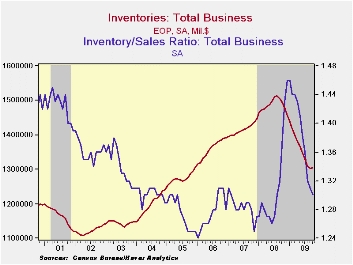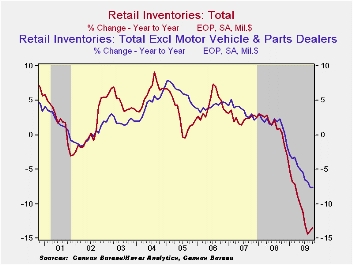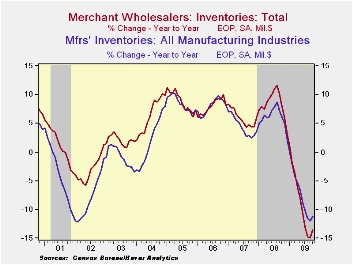 Global| Dec 14 2009
Global| Dec 14 2009U.S. Business Inventories' Gain The First Since 2008
by:Tom Moeller
|in:Economy in Brief
Summary
As the downward momentum in business sales recently slackened, so too did businesses' attitude toward holding inventories. In constant dollars, during 3Q '09 inventory cuts turned into accumulation that added 0.9 percentage points to [...]

As the downward momentum in business sales recently slackened, so too did businesses' attitude toward holding inventories. In constant dollars, during 3Q '09 inventory cuts turned into accumulation that added 0.9 percentage points to real GDP growth. In October the turn continued as business inventories rose 0.2%, the first monthly increase since last year. The gain followed a slightly revised 0.5% September drop. Consensus expectations were for a 0.2% decline.
 Inventory accumulation last month was apparent in the factory
and wholesale sectors. Wholesale inventories rose 0.3% but the gain was
largely driven by a 4.6% (+24.1% y/y) increase in petroleum
inventories. Elsewhere, accumulation was limited. In the factory
sector, inventories posted a modest 0.4% increase after a 1.4% drop.
However, the increase also was primarily driven by a 6.4% jump in
petroleum inventories.
Inventory accumulation last month was apparent in the factory
and wholesale sectors. Wholesale inventories rose 0.3% but the gain was
largely driven by a 4.6% (+24.1% y/y) increase in petroleum
inventories. Elsewhere, accumulation was limited. In the factory
sector, inventories posted a modest 0.4% increase after a 1.4% drop.
However, the increase also was primarily driven by a 6.4% jump in
petroleum inventories.
Retail inventories were unchanged during October as motor vehicle inventories rose 0.6% (-26.6% y/y) after a 4.1% September increase. Furniture inventories also increased by 1.0% (-11.1% y/y) after a 0.2% rise during September. Elsewhere, retail inventories continued to decline, but at a slower rate. Clothing inventories fell 0.6% (-11.3% y/y) which was less than the 1.8% September drop. General merchandise inventories fell negligibly (-6.3% y/y) following a 0.5% September decline. Inventories at building materials and garden supply stores fell 0.7% (-10.1% y/y) after a reduced 0.4% September decline.
 For the fifth straight month, business sales rose and the 1.1%
(-8.2% y/y) increase reflected across-the-board gains. Retail sales
rose 1.3% during October and increased another 1.4% last month. Sales
of merchant wholesalers were quite strong for the third month although
much of the increase reflects higher oil prices. Factory shipments
jumped 3.5% (-1.2% y/y) but again, a 7.0% rise petroleum shipments
accounted for much of the total gain.
For the fifth straight month, business sales rose and the 1.1%
(-8.2% y/y) increase reflected across-the-board gains. Retail sales
rose 1.3% during October and increased another 1.4% last month. Sales
of merchant wholesalers were quite strong for the third month although
much of the increase reflects higher oil prices. Factory shipments
jumped 3.5% (-1.2% y/y) but again, a 7.0% rise petroleum shipments
accounted for much of the total gain.
Despite a possible interest in slowing the rate of inventory cutbacks, the inventory-to-sales ratio for total business fell to a cycle low of 1.30 versus a high of 1.46 in January. The latest was the lowest since last September. In the retail sector the ratio fell and reversed the September increase. For manufacturers and wholesalers, the ratio fell to new cycle lows.
The business sales and inventory data are available in Haver's USECON database.
Visit the Wall Street Journal's Blog Remembering Paul Samuelson
| Business Inventories (%) | October | September | August | Y/Y | 2008 | 2007 | 2006 |
|---|---|---|---|---|---|---|---|
| Total | 0.2 | -0.5 | -1.6 | -12.6 | 0.6 | 4.0 | 6.4 |
| Retail | 0.0 | 0.5 | -2.6 | -13.5 | -3.1 | 2.5 | 3.3 |
| Retail excl. Auto | -0.2 | -0.7 | -0.7 | -7.6 | -1.8 | 2.7 | 4.7 |
| Wholesale | 0.3 | -0.8 | -1.3 | -13.5 | 3.1 | 6.2 | 8.2 |
| Manufacturing | 0.4 | -1.3 | -0.9 | -11.2 | 2.1 | 3.7 | 8.2 |
Tom Moeller
AuthorMore in Author Profile »Prior to joining Haver Analytics in 2000, Mr. Moeller worked as the Economist at Chancellor Capital Management from 1985 to 1999. There, he developed comprehensive economic forecasts and interpreted economic data for equity and fixed income portfolio managers. Also at Chancellor, Mr. Moeller worked as an equity analyst and was responsible for researching and rating companies in the economically sensitive automobile and housing industries for investment in Chancellor’s equity portfolio. Prior to joining Chancellor, Mr. Moeller was an Economist at Citibank from 1979 to 1984. He also analyzed pricing behavior in the metals industry for the Council on Wage and Price Stability in Washington, D.C. In 1999, Mr. Moeller received the award for most accurate forecast from the Forecasters' Club of New York. From 1990 to 1992 he was President of the New York Association for Business Economists. Mr. Moeller earned an M.B.A. in Finance from Fordham University, where he graduated in 1987. He holds a Bachelor of Arts in Economics from George Washington University.






